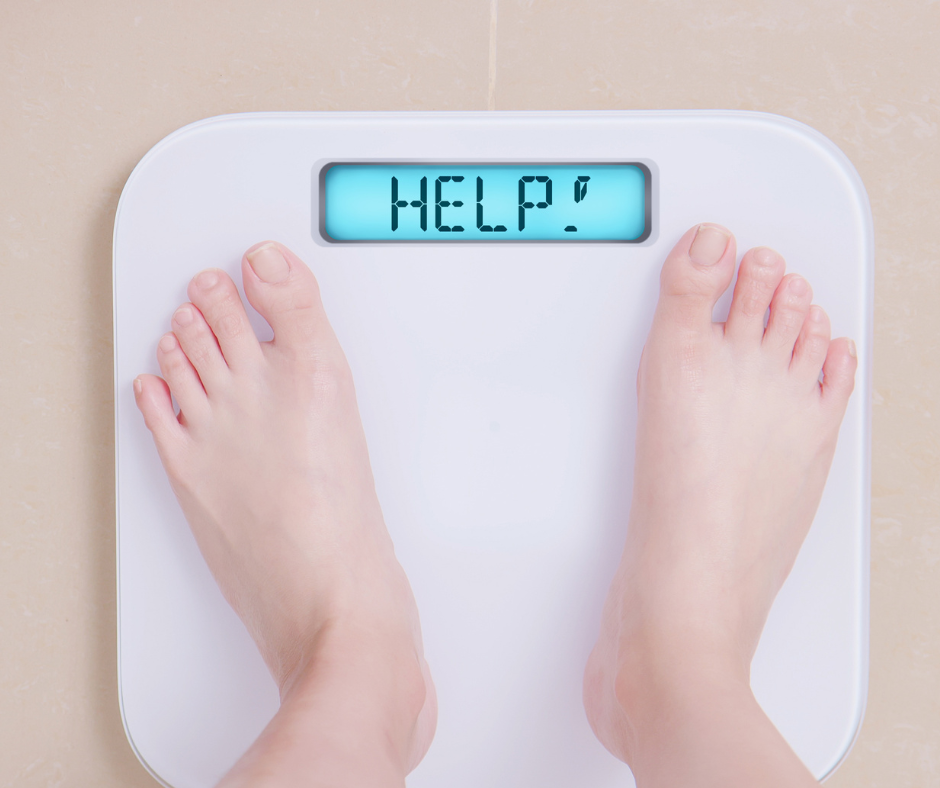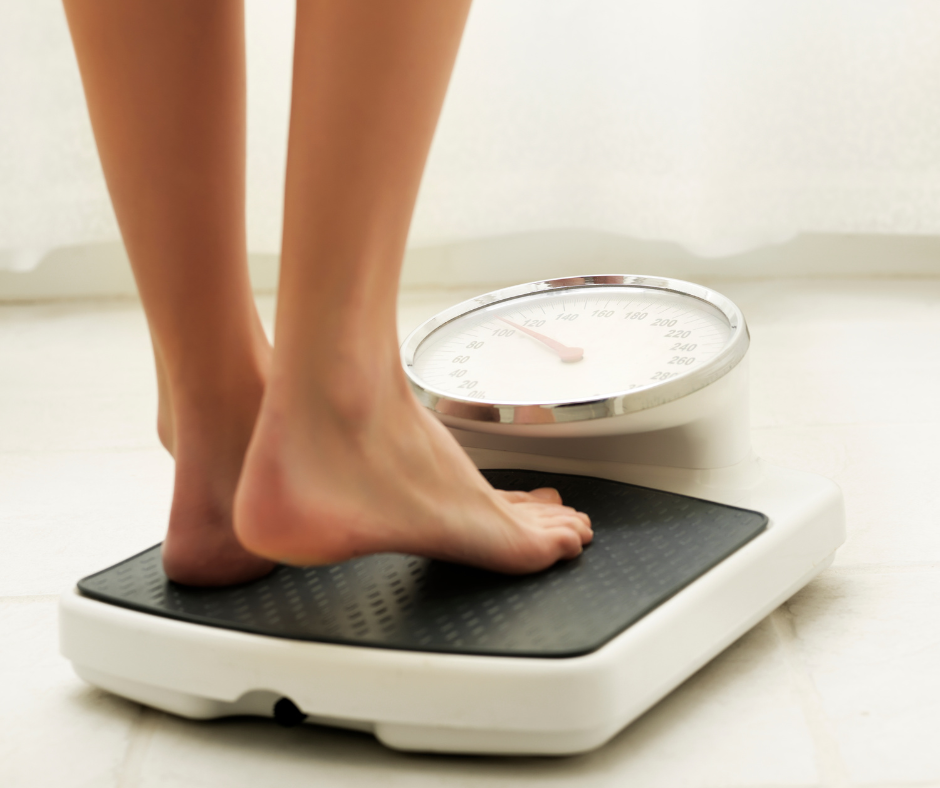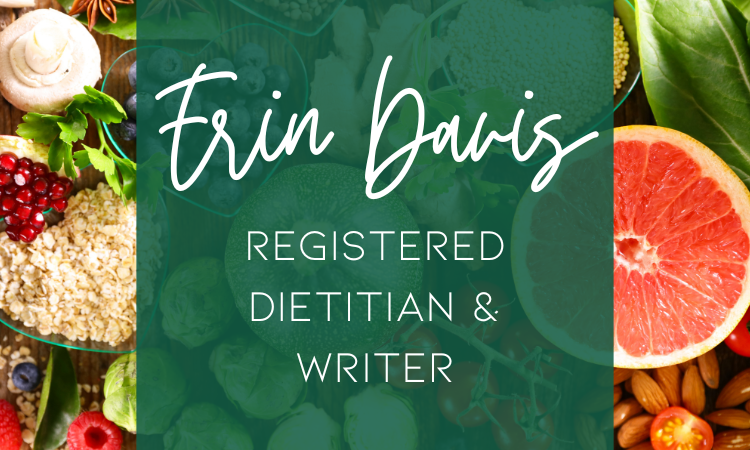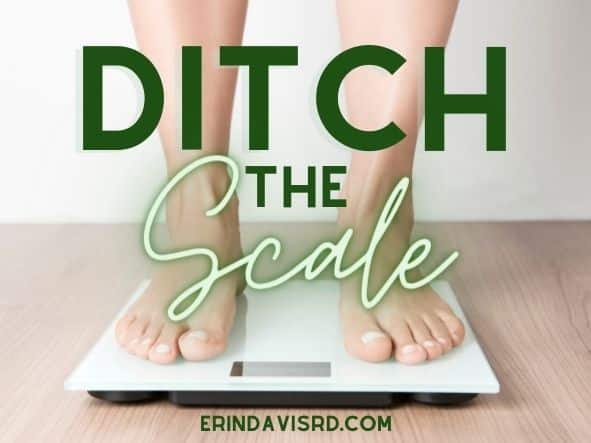It’s time to ditch the scale! Does that sound scary? Do you rely on that scale? Today, I want to talk about how the scale could be holding you back—from several things, including becoming an intuitive eater or having a good day.
Have you weighed yourself today? If you did, you’re not alone. Weighing in seems to be one of the hardest habits to drop when starting intuitive eating.
We weigh ourselves to see how “we are doing”. There is a fear that if we let it go, we’ll go off the deep end. The scale is used to see if our hard work has paid off.
Unfortunately, we also sometimes use the scale to show us our worth.
If you’re new here, hi! I’m Erin, an anti-diet registered dietitian and certified intuitive eating counselor. I specialize in healing food relationships. I believe you can be healthy WITHOUT dieting.
Additionally, I wholeheartedly believe you can achieve improved health outcomes even if you ditch the scale. Today’s post is about letting go of the scale and what you can do instead.
Disclaimer: Some of the links are affiliate links, meaning I may earn a small commission should you click on the link and purchase the recommended item. Thank you for your support!
The scale and anxiety about weight gain

Can you think of any good that comes from the scale? Think about your mood prior to getting on the scale. Are you hopeful, nervous, anxious, dreadful?
How about after? Disappointed, relieved, excited, mad? Let’s say you see a number that makes you happy. Do you now feel pressure to stay at that number? Will it require a great deal of effort?
The number on the scale shouldn’t dictate your mood. But it definitely can change the way you feel, doesn’t it? I’ve had plenty of perfectly fine days ruined by the scale.
Why do we let that number impact our day? Not to mention the precious years we spend restrictively dieting, trying to get down to a magic number.
We tell ourselves lies about our weight. We’ll be happier if we lose X pounds. We’ll go on that vacation when we are X pounds. That we’ll deserve true love or respect when we lose X pounds.
But it is just a number! It does not tell us anything about health, wellness, or worth.
Is weighing yourself every day bad?

Daily weighing is often recommended as a weight-loss tool. And yes, frequent weighing seems to be associated with weight loss.
However, when we look at the big picture (long term), these studies show that frequent weighing isn’t the best for your health:
- Weight gain: Young adults who frequently weighed themselves had greater weight gain than those who weighed less frequently.
- Food addiction: Those who weighed themselves and had a negative emotional reaction (um, anyone who has ever weighed themselves) are more likely to have food addiction and poorer obesity and binge eating disorder treatment outcomes.
- Negative mood: This should come as no surprise to you if you’ve weighed yourself. It affects your mood, especially for women and those with weight concerns.
- Disordered eating: The development of an eating disorder usually starts with an innocent goal to lose weight. Turns out that self-weighing and weight-related monitoring apps are directly related to the development of disordered eating behaviors.
- Body dissatisfaction: Weighing yourself, or body checking, is associated with poorer body image.
Sure, in the short term, weighing yourself may “keep you on track” with weight loss. But you run the risk of ruining your relationship with food and your body.
But what if you have been told you need to lose weight to improve your blood pressure, diabetes, PCOS, or other health conditions?
Let’s talk about what you can do to improve your health without weighing yourself
Focus on internal cues vs. external cues for eating

Your body is designed to know when to eat. We should get an internal hunger cue when it’s time to eat.
However, what happens when we weigh ourselves and find the number higher than we wanted? The scale becomes an external cue for eating.
Maybe you eat less than what your body needs because you want the number to go down. You reduce your calorie or macros and restrict. This requires ignoring your internal cues for hunger.
Another typical response is that you eat more than your body needs because you are frustrated and eating emotionally. You again, ignore your hunger and fullness cues that naturally occur in your body.
Disclaimer: if you are recovering from an eating disorder or extreme restriction, it is possible you don’t feel hunger cues; that is something that needs to be worked on during recovery.
It can be helpful to try some mindful eating exercises to get in tune with your body’s cues.
Normally, every 2-3 hours, most people feel hungry. Where do you feel your hunger? Does your stomach growl? Pay attention to how it feels. Then honor your hunger by eating! And eat until you are full.
Focus on non-scale victory
There are so many aspects to your health, not just weight. Do you feel stronger and more energetic when you exercise? Can you play with your kids without getting winded?
Is your digestion better since increasing your fiber intake? Is your blood sugar lower now that you’ve stopped binging and restricting?
These are all non-scale victories that should be celebrated. Research shows that recommending weight loss isn’t always helpful for improving health.
It is the health behaviors, such as a nutrient-rich diet, and regular physical activity, independent of weight, improves health outcomes.
That means that if we eat a wide variety of foods, including fruits, vegetables, fish, whole grains, etc., and move our bodies, we can reduce our risk for disease. No scale needed.
On the other hand, when we tie our health to the scale, we can often have an “all or nothing” attitude. We try hard to lose weight—we get as much exercise as we can and we eat well.
Then, when we find the scale isn’t showing what we want, we give up. We stop healthy behaviors because of what the scale said.
When you avoid the scale altogether and just focus on adding in nutrient-dense food (like this delicious kale and blueberry salad) to fuel your body for action, you’ll feel better and defeat the mood-changing power of the scale.
Hide the scale or destroy it

I’d vote for throwing it off of a cliff or another destructive method to get rid of it for good.
But if you don’t feel comfortable with that, perhaps hide it. Stepping on the scale can be a habit. We are more likely to do it if the scale is out in the open.
Put it in the back of your closet, or spare bedroom. Anywhere you won’t be frequently reminded to step on it.
Ditch the scale for a short period

If you are weighing in daily, I challenge you to put the scale away for a week. Too daunting? Maybe try once a week, gradually moving to monthly, then not at all.
Journal about your mood before you get on the scale, then after. Take notice of how it impacts your eating for the day.
If you have frequent doctor’s visits, you can opt out of a weight check. It is your body. You shouldn’t be shamed because of the size of your body. Weight stigma can negatively impact your health.
If it is necessary for medication prescribing, get on the scale backward and tell them you don’t want to know the number. If they aren’t respectful of your wishes, I’d consider finding a medical care team that supports your physical and mental health.
Seek help
It may be difficult to give up weighing yourself. You may desire weight loss so badly, it can become part of your identity.
But you are so much more than the weight on the scale. Don’t go it alone.
Are you ready to trust that your body can manage your food needs, without the help of the scale? What are your fears? Oppositely, what are the benefits of no longer weighing yourself? What will you gain?
I’m here to guide you through that journey to food and scale freedom. Book a free discovery call to see if my services align with your goals. I look forward to meeting you!
References
References
- Steinberg DM, Bennett GG, Askew S, Tate DF. Weighing every day matters: daily weighing improves weight loss and adoption of weight control behaviors. J Acad Nutr Diet. 2015;115(4):511-518. doi:10.1016/j.jand.2014.12.011
- Vuorinen AL, Helander E, Pietilä J, Korhonen I. Frequency of Self-Weighing and Weight Change: Cohort Study With 10,000 Smart Scale Users. J Med Internet Res. 2021;23(6):e25529. Published 2021 Jun 28. doi:10.2196/25529
- Rohde P, Arigo D, Shaw H, Stice E. Relation of self-weighing to future weight gain and onset of disordered eating symptoms. J Consult Clin Psychol. 2018;86(8):677-687. doi:10.1037/ccp0000325
- Wiedemann AA, Ivezaj V, Gueorguieva R, Potenza MN, Grilo CM. Examining Self-Weighing Behaviors and Associated Features and Treatment Outcomes in Patients with Binge-Eating Disorder and Obesity with and without Food Addiction. Nutrients. 2020;13(1):29. Published 2020 Dec 23. doi:10.3390/nu13010029
- Hahn SL, Pacanowski CR, Loth KA, Miller J, Eisenberg ME, Neumark-Sztainer D. Self-weighing among young adults: who weighs themselves and for whom does weighing affect mood? A cross-sectional study of a population-based sample. J Eat Disord. 2021;9(1):37. Published 2021 Mar 10. doi:10.1186/s40337-021-00391-y
- Hahn SL, Hazzard VM, Loth KA, Larson N, Klein L, Neumark-Sztainer D. Using apps to self-monitor diet and physical activity is linked to greater use of disordered eating behaviors among emerging adults. Prev Med. 2022;155:106967. doi:10.1016/j.ypmed.2022.106967
- Hahn SL, Sonneville KR, Kaciroti N, Eisenberg D, Bauer KW. Relationships between patterns of technology-based weight-related self-monitoring and eating disorder behaviors among first year university students. Eat Behav. 2021;42:101520. doi:10.1016/j.eatbeh.2021.101520
- Walker DC, White EK, Srinivasan VJ. A meta-analysis of the relationships between body checking, body image avoidance, body image dissatisfaction, mood, and disordered eating. Int J Eat Disord. 2018;51(8):745-770. doi:10.1002/eat.22867
- Malighetti C, Sansoni M, Gaudio S, et al. Altered inner body perception in anorexia and bulimia nervosa: a systematic review. doi:10.3390/jcm11237134.
- Bacon L, Aphramor L. Weight science: evaluating the evidence for a paradigm shift [published correction appears in Nutr J. 2011;10:69]. Nutr J. 2011;10:9. Published 2011 Jan 24. doi:10.1186/1475-2891-10-9
- Matheson EM, King DE, Everett CJ. Healthy lifestyle habits and mortality in overweight and obese individuals. J Am Board Fam Med. 2012;25(1):9-15. doi:10.3122/jabfm.2012.01.110164
- Talumaa B, Brown A, Batterham RL, Kalea AZ. Effective strategies in ending weight stigma in healthcare. Obes Rev. 2022;23(10):e13494. doi:10.1111/obr.13494
Disclaimer: This information is intended as a self-help tool for your own use, at your own risk. My opinions do not reflect the values, thoughts, or opinions of the Academy of Nutrition and Dietetics or other professional health organizations.
About the author
Erin is a registered dietitian and diabetes educator with almost 20 years of experience. She specializes in weight-inclusive diabetes care and prevention, intuitive eating, fitness, and women’s health. She works as a consultant and writer in the health and wellness space. Erin is passionate about empowering people to manage their own health and to have peace with food.


